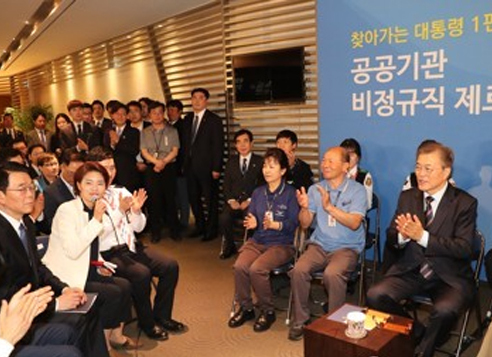New industries such as electric and autonomous vehicles, smart ships and robots will create some 380,000 new jobs, a report by the Minister of Commerce, Industry and Energy showed Wednesday.
In the report released at a forum of experts, academics and businesses, the ministry said such jobs will be created by 2025 from 12 sectors it designated as new industries last year.
The forum was held on the heels of President Moon Jae-in appointing himself the chief of the new presidential jobs creation committee Tuesday. As prioritized steps, Moon has vowed to reduce the number of irregular workers in the public sector to zero within his five-year term.
 |
(Yonhap) |
The 12 industries cited by the ministry include: electric and autonomous vehicles; smart ships; Internet of Things appliances; robots; bio-health; aircrafts and drones; premium consumer goods; augmented reality and virtual reality; next-generation displays; and next-generation semiconductors.
There are currently some 203,000 workers belonging to these industries. The number is expected to increase to 362,000 by 2020 and 585,000 by 2025, with an annual average increase of 11.2 percent.
The report also suggested the new jobs will be among those with professional expertise rather than administration or service related jobs.
While the imminent task taken by the government under the lead of the newly formed presidential jobs committee would target the public sector, the participants urged the private sector to join in creating an environment to foster new jobs.
Lee Yong-seop, who was appointed as concurrent vice chairman of the committee and special adviser on policy to the president on Tuesday, said the new government’s key task is to change the fundamental structure of the Korean economy into one creating jobs.
“We should change the current structure where economic growth drives job creation into one where jobs are sustainable,” Lee was quoted by Yonhap News Agency as saying.
“Some say the private sector should create jobs, but that is an old idea. Numerous people can’t have jobs although they are willing to work. This is the market’s failure and inability.”
He said a boost in jobs in the public sector will prime the pump for the private sector, hopefully contributing to overall economic growth.
The jobs creation committee, approved by the Cabinet, will be comprised of 15 government officials and 15 civil members. The 15 government officials include 11 ministers, three heads of the state-run economic think tanks and a senior presidential secretary. The 15 civil members include six representatives from the two largest umbrella labor groups, a representative group of irregular workers, the Korea Federation of SMEs, Korea Employers Federation, Korea Chamber of Commerce and Industry and nine jobs experts.
Meanwhile, further data released by corporate tracker CEO Score on Wednesday showed that one-third of employees at Korea’s state-run companies work under temporary contracts.
The number of irregular workers at 35 state-run companies amounted to 57,031 out of the total 171,659 employees as of the end of March.
Over the past five years, the number of irregular workers in the public sector jumped by 10,392, while that of regular employees rose by 6,259. The proportion of irregular workers rose to 33.2 percent in 2017 from 30.1 percent at the end of 2012, the data showed.
Incheon International Airport Corp., which President Moon recently visited to promise a full transition of irregular jobs to regular ones, had the highest proportion of temporary workers at 85.6 percent.
Korea Racing Authority had the second-highest proportion of irregular workers with 81.9 percent, followed by Korea Airports Corp. with 68.4 percent.
Korea Hydro and Nuclear Power, an operator of nuclear power plants, had the fastest increase in the number of irregular workers in the past five years. Its proportion of temporary workers rose by 27.3 percentage points to 38.9 percent in 2017 from 11.7 percent in 2012.
In contrast, Korea Gas Technology Corp. had the lowest proportion of irregular workers at 7.6 percent.
Regular workers were paid about 1.69 times higher than irregular workers at 97 state-run companies in 2016, according to the latest government data. The average annual salary of regular workers was 68.9 million won ($61,600) last year, while that of irregular workers was 40.8 million won.
By Kim Yoon-mi (
yoonmi@heraldcorp.com)







![[Lee Byung-jong] The perils of political leadership](http://res.heraldm.com/phpwas/restmb_idxmake.php?idx=644&simg=/content/image/2024/12/19/20241219050082_0.jpg)
